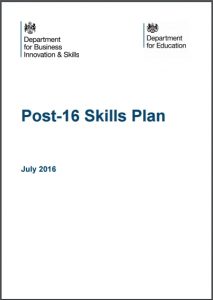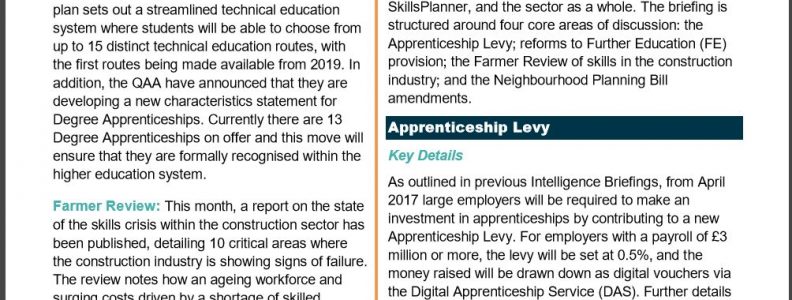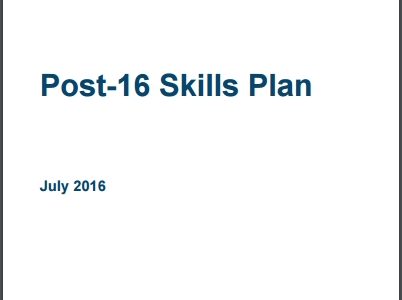The Government’s new Housing White Paper, Fixing our Broken Housing Market, mentions skills 20 times (most of the mentions are on page 41) in a largely underwhelming document over 100 pages long. However, it doesn’t say anything particularly new or radical about skills – though this is perhaps to be expected from a Conservative Government writing about an inherently conservative industry (and house-building is, arguably, the most conservative sector within construction).
It makes a passing mention of Mark Farmer’s review, Modernise or Die, published in October 2016 (read our post), touching on his advocacy of offsite fabrication (read this Construction Index summary, for example), and acknowledges that the industry faces particular challenges in certain regions, such as London and the South East, as Brexit looms. It continues:
“This is an important moment and we should make the most of the opportunity for industry to invest in its workforce, alongside tackling the issues raised by the Farmer Review. The larger companies need to take responsibility for ensuring that they have a sustainable supply chain, working with contractors to address skills requirements.”
Three areas are singled out for Government action. It says it will:
 “change the way the Government supports training in the construction industry” – This will include the conclusion of an ongoing review, chaired by Paul Morrell, of the Construction Industry Training Board’s purpose, functions and operations, with the government looking to “ensure that developers benefitting from public funding use the projects to train the workforce of the future.”
“change the way the Government supports training in the construction industry” – This will include the conclusion of an ongoing review, chaired by Paul Morrell, of the Construction Industry Training Board’s purpose, functions and operations, with the government looking to “ensure that developers benefitting from public funding use the projects to train the workforce of the future.”- “launch a new route into construction in September 2019” – as announced in the Skills Plan produced in July 2016 (blog post), it says it will “streamline the number of courses available and improve quality and employability”
- “work across Government, with the Construction Leadership Council, to challenge house builders and other construction companies to deliver their part of the bargain.”
The white paper then highlights what can be achieved from investing in training as part of major construction programmes such as Crossrail, to see whether this approach can be applied more broadly in the construction sector, particularly by holding developers and local authorities to account. This is mainly about improving transparency of the end-to-end house building process, and identifying where blockages lie (encouragingly there are three mentions of “transparent data”). This could be an areas where SkillsPlanner’s modelling of supply and demand of construction skills could play a crucial role, as Mark Farmer pointed out last year.
“The increasing importance of data means that such approaches would better enable the business case for investment in training and new ways of delivering by better aligning investment to a demand pipeline. … The culture of ‘data silos’ within the industry needs to be broken as part of the wider societal democratisation of data.”




 “Lack of collaboration and joined up thinking also means the ability to use ‘open linked / big data’ principles to guide the industry on current and future skills requirements have not been maximised. The increasing importance of data means that such approaches would better enable the business case for investment in training and new ways of delivering by better aligning investment to a demand pipeline. … The culture of ‘data silos’ within the industry needs to be broken as part of the wider societal democratisation of data.”
“Lack of collaboration and joined up thinking also means the ability to use ‘open linked / big data’ principles to guide the industry on current and future skills requirements have not been maximised. The increasing importance of data means that such approaches would better enable the business case for investment in training and new ways of delivering by better aligning investment to a demand pipeline. … The culture of ‘data silos’ within the industry needs to be broken as part of the wider societal democratisation of data.”
 The report also underlines key issues within the construction value-chain relating to Smart Construction, including a lack of Smart Construction skills, and the growing use of automated construction processes. The CLC’s innovation workstream has set up a number of working groups to address some of the challenges to adoption of Smart Construction, but key work on skills and culture appears to be the responsibility of the CLC’s skills workstream. (As
The report also underlines key issues within the construction value-chain relating to Smart Construction, including a lack of Smart Construction skills, and the growing use of automated construction processes. The CLC’s innovation workstream has set up a number of working groups to address some of the challenges to adoption of Smart Construction, but key work on skills and culture appears to be the responsibility of the CLC’s skills workstream. (As 
 Each work-stream is being led by a relevant organisation that will submit recommendations to the Taskforce by the end of the year, and the Chartered Institute of Building (CIOB, author of a 2015 report on the
Each work-stream is being led by a relevant organisation that will submit recommendations to the Taskforce by the end of the year, and the Chartered Institute of Building (CIOB, author of a 2015 report on the 


